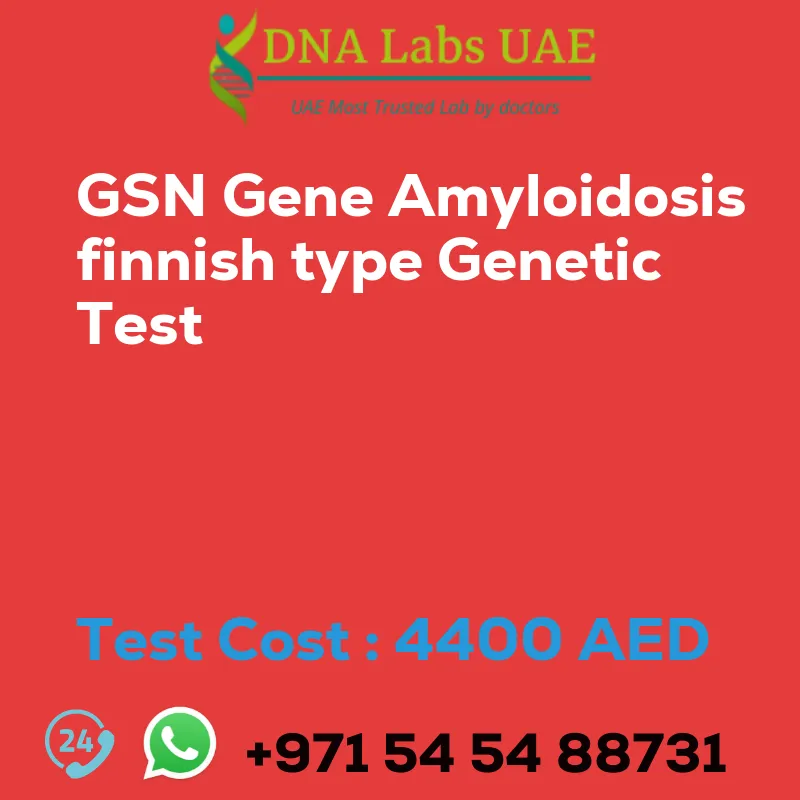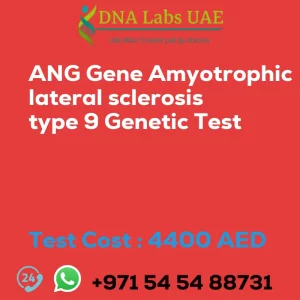GSN Gene Amyloidosis Finnish Type Genetic Test
Are you concerned about Finnish-type familial amyloidosis? DNA Labs UAE offers the GSN Gene Amyloidosis Finnish Type Genetic Test at a cost of AED 4400.0. This comprehensive test can help diagnose this genetic disorder and guide treatment decisions.
Test Details
The GSN gene amyloidosis, Finnish type NGS genetic test is a diagnostic tool used to identify mutations in the GSN gene that cause Finnish-type familial amyloidosis. This genetic disorder is characterized by the accumulation of an abnormal protein called gelsolin in various organs and tissues, leading to organ dysfunction and failure.
The test uses next-generation sequencing (NGS) technology to analyze the DNA sequence of the GSN gene and detect any mutations or variations that may be present. The results of the test can help confirm a diagnosis of Finnish-type familial amyloidosis and inform treatment decisions.
Test Components and Price
- Test Name: GSN Gene Amyloidosis Finnish Type Genetic Test
- Components: NGS Technology
- Price: AED 4400.0
Sample Condition
The test requires a blood or extracted DNA sample. Alternatively, one drop of blood can be collected on an FTA card.
Report Delivery
The report will be delivered within 3 to 4 weeks after the sample is received by the laboratory.
Test Type
This test is specifically designed for the diagnosis of neurological disorders, such as Finnish-type familial amyloidosis.
Referring Doctor
This test is typically ordered by a neurologist, who specializes in the diagnosis and treatment of neurological disorders.
Test Department
This test is conducted in the Genetics department of DNA Labs UAE.
Pre Test Information
Prior to undergoing the GSN Gene Amyloidosis Finnish Type Genetic Test, it is important to provide the clinical history of the patient. Additionally, a genetic counseling session may be conducted to draw a pedigree chart of family members affected by GSN Gene Amyloidosis Finnish Type.
Treatment and Genetic Counseling
If a positive test result confirms the presence of a GSN gene mutation, it is important to note that it does not necessarily predict the severity or progression of the disease. Treatment options may include medications to manage symptoms and, in severe cases, organ transplantation. Genetic counseling is also recommended for individuals with a positive test result and their family members to discuss inheritance patterns and potential risks.
| Test Name | GSN Gene Amyloidosis finnish type Genetic Test |
|---|---|
| Components | |
| Price | 4400.0 AED |
| Sample Condition | Blood or Extracted DNA or One drop Blood on FTA Card o |
| Report Delivery | 3 to 4 Weeks |
| Method | NGS Technology |
| Test type | Neurological Disorders |
| Doctor | Neurologist |
| Test Department: | Genetics |
| Pre Test Information | Clinical History of Patient who is going for GSN Gene Amyloidosis, finnish type NGS Genetic DNA Test A Genetic Counselling session to draw a pedigree chart of family members affected with GSN Gene Amyloidosis, finnish type |
| Test Details |
The GSN gene amyloidosis, Finnish type NGS genetic test is a diagnostic tool used to identify mutations in the GSN gene that cause Finnish-type familial amyloidosis. This genetic disorder is characterized by the accumulation of an abnormal protein called gelsolin in various organs and tissues, leading to organ dysfunction and failure. The test uses next-generation sequencing (NGS) technology to analyze the DNA sequence of the GSN gene and detect any mutations or variations that may be present. The results of the test can help confirm a diagnosis of Finnish-type familial amyloidosis and inform treatment decisions. The test is typically ordered by a healthcare provider for individuals with a family history of the disorder or those who are experiencing symptoms such as neuropathy, muscle weakness, or gastrointestinal problems. The test requires a blood or saliva sample, which is sent to a laboratory for analysis. It is important to note that while a positive test result confirms the presence of a GSN gene mutation, it does not necessarily predict the severity or progression of the disease. Treatment options may include medications to manage symptoms and organ transplantation in severe cases. Genetic counseling is also recommended for individuals with a positive test result and their family members to discuss inheritance patterns and potential risks. |








